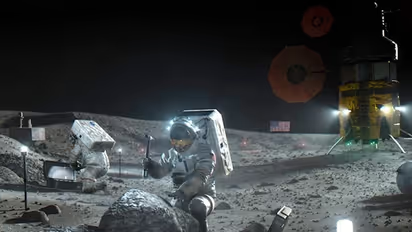Garbage on Moon! NASA offers $3 million in cash for solutions to recycle waste on lunar surface

Synopsis
NASA's LunaRecycle Challenge offers a $3 million reward for innovative ways to recycle waste in space crucial for extended lunar missions. As part of the Centennial Challenge program NASA encourages participants to develop effective recycling methods that reduce waste on the moon.
NASA is calling on brilliant minds worldwide to tackle one of space exploration’s most pressing challenges - waste management. With the staggering cost of transporting just one pound of material to the Moon and back soaring to nearly $100,000, efficiency is no longer a choice—it’s a necessity.
Enter the LunaRecycle Challenge, NASA’s ambitious $3 million crowdsourcing initiative aimed at revolutionizing how astronauts reuse materials during lunar missions.
“Astronauts will need to make the most of everything they bring with them, even their garbage,” the space agency stated in a compelling promotional video. The challenge focuses on finding innovative ways to recycle “non-gaseous, non-biological, and non-metabolic” solid waste, such as packaging, fabrics, and structural components, into valuable, usable products.
This transformative project isn’t just about managing space trash; it’s about paving the way for sustainable off-planet exploration. NASA envisions solutions that could redefine resource utilization for missions to the Moon, Mars, and beyond while also benefiting life on Earth.
NASA encourages designers, scientists, engineers, and other US citizens to participate. The first step? Join a webinar on November 25 at 1 PM EST, where the agency will explore the concept of digital twins—real-time data simulations that drive cutting-edge modeling techniques.
The challenge’s first phase offers $1 million in prize money and is divided into two innovative tracks:
- Digital Twin Track: Competitors will create virtual simulations of their recycling technologies, integrating real-world data for precise models.
- Prototype Build Track: Teams will present detailed, tangible designs of their cutting-edge inventions.
Phase 2, contingent on promising submissions in Phase 1, will raise the stakes with an additional $2 million in prize money. The University of Alabama’s Dr. Rajiv Doreswamy, director of space technologies and engineering research, will oversee the challenge in collaboration with NASA’s historic Marshall Space Flight Center in Huntsville, Alabama.
In a reassuring move, NASA and the University of Alabama have promised not to claim intellectual property (IP) rights from participants. “All trade secrets, copyrights, patent rights, and software rights will remain with each respective team,” the FAQ clarified.
Future of space exploration
In a statement, NASA said, “As NASA prepares to establish a human presence on and around the Moon, ‘reduce, reuse, recycle’ will become a universal model, not just an Earthly one.”
The stakes are even higher for Mars missions, where transporting a pound of material could cost as much as $1 million, according to Dr. Ibrahim Guven, an associate professor at Virginia Commonwealth University. “At that price, astronauts have to make every trip count,” Dr. Guven remarked with a touch of humor: “You don’t want to just jump off the spacecraft, get a scoop of Mars material, and come home.”
Check the Breaking News Today and Latest News from across India and around the world. Stay updated with the latest World News and global developments from politics to economy and current affairs. Get in-depth coverage of China News, Europe News, Pakistan News, and South Asia News, along with top headlines from the UK and US. Follow expert analysis, international trends, and breaking updates from around the globe. Download the Asianet News Official App from the Android Play Store and iPhone App Store for accurate and timely news updates anytime, anywhere.